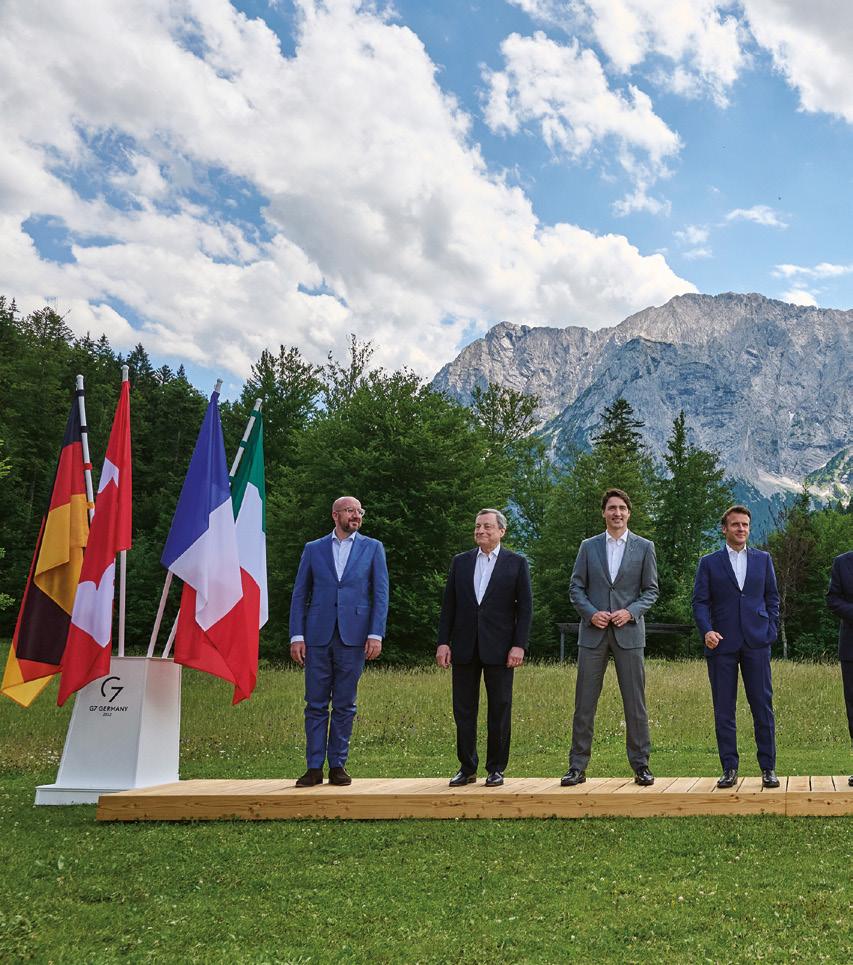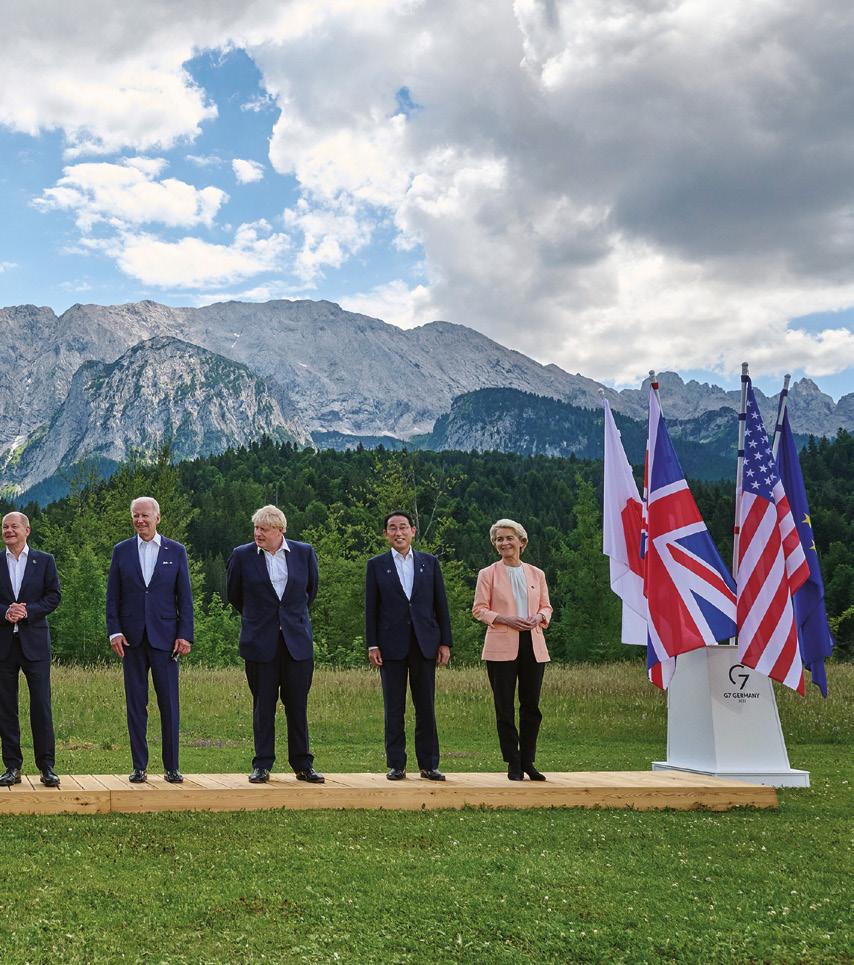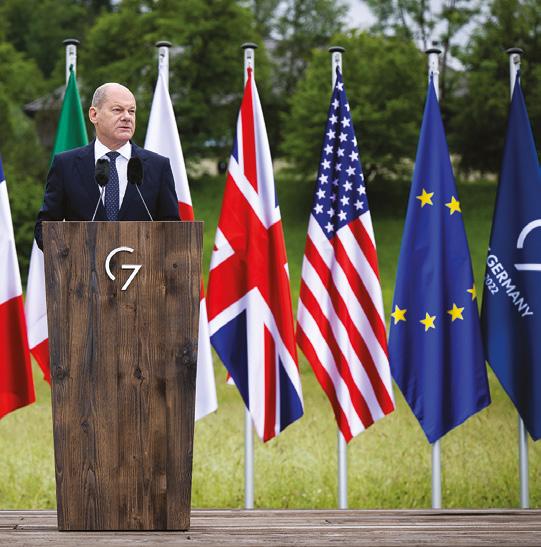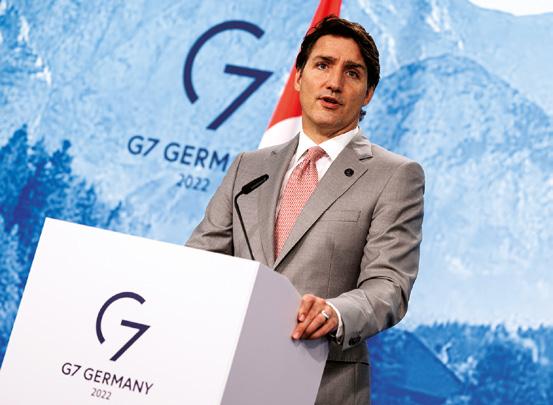
13 minute read
Economy of Trust Ukraine


E l m a u , 28 J u n e 2022
l e a d e r s CO M M U N I Q U E ’

We, the Leaders of the Group of Seven (G7), met in Elmau on 26-28 June 2022, at a critical juncture for the global community, to make progress towards an equitable world. As open democracies adhering to the rule of law, we are driven by shared values and bound by our commitment to the rulesbased multilateral order and to universal human rights. As outlined in our Statement on support for Ukraine, standing in unity to support the government and people of Ukraine in their fight for a peaceful, prosperous and democratic future, we will continue to impose severe and immediate economic costs on President Putin’s regime for its unjustifiable war of aggression against Ukraine, while stepping up our efforts to counter its adverse and harmful regional and global impacts, including with a view to helping secure global energy and food security as well as stabilising the economic recovery. At a time when the world is threatened by division, we will jointly assume our responsibility and work with partners around the world to find solutions to pressing global challenges such as →

→ tackling climate change, and securing a just transition as well as addressing the current and future pandemics and achieving gender equality.
We were joined in Elmau by the Leaders of Argentina, India, Indonesia, Senegal and South Africa, with whom we are united in our commitment to protect and strengthen our democracies, and to jointly address global challenges in close cooperation with other international partners and organisations. The commitments we make today will shape our path towards a sustainable development and inclusive economic recovery, and a prosperous and peaceful future, in line with the Agenda 2030.
A S u s t a i n a b l e P l a n e t
C l i m a t e a n d E n e r gy We reaffirm our unwavering commitment to the Paris Agreement, and its strengthened implementation. Informed by the Intergovernmental Panel on Climate Change (IPCC), we note with concern that currently neither global ambition nor implementation is sufficient to achieve the goals of the Paris Agreement. We highlight the increased urgency to act to reduce global greenhouse gas emissions by around 43 per cent by 2030, relative to the 2019 level, in light of the latest findings of the IPCC, in order to limit global warming to 1.5 °C. As a response and in the run up to COP 27, we commit to urgent, ambitious, and inclusive action in this decade and urge others to do so as well. We also commit to keep a limit of 1.5 °C temperature rise within reach, to enhance resilience and adaptive capacity to the impacts of climate change, and to align financial flows with the goals of the Paris Agreement. We will fully play our part in urgently implementing the Glasgow Climate Pact. We strongly support and recall its request to Parties to revisit and strengthen the 2030 targets in their NationallyDetermined Contributions (NDCs) as necessary to align with the Paris Agreement temperature goal by the end of 2022. We urge all countries – especially major emitters – whose 2030 NDC targets are not yet aligned, to increase their ambition and align 2030 NDC targets with a 1.5 °C pathway well before COP 27.
We will effectively implement domestic mitigation measures to achieve our NDC targets and commit to increase our ambition, including for example, by adopting or strengthening sectoral targets, non-CO2 sub-targets, or stringent implementation measures. We commit to enhance our support for developing countries in updating and implementing their NDCs and Long-Term Strategies, including through our contribution to multilateral funds or bilateral support. Enhancing action and support for adaptation and resilience in vulnerable countries, we will work towards ambitious results for a global goal on adaptation. We recognise the adverse effects of climate change and environmental degradation on peace, stability, and security, and will work together with the global community to counter these impacts. We will continue to coordinate on the most appropriate economic and fiscal policies to support decarbonisation in an efficient, effective, and equitable way.
We recognise the importance of innovation in driving deep decarbonisation. We commit to a highly decarbonised road sector by 2030 including by, in this decade, significantly increasing the sales, share and uptake of zero emission light duty vehicles, including zero emission public transport and public vehicle fleets. We recognise the range of pathways that we are adopting to approach this goal. We commit to support a Paris-compatible global goal on net-zero emissions from international aviation no later than 2050, to strengthen global efforts to achieve net-zero emissions from international shipping by 2050 at the latest. We will continue to be mindful with regards to our long-term drive towards alternative fuels for transport, to our objectives on climate and biodiversity and food security. We commit to reduce emissions of hydrofluorocarbons (HFC) throughout the life cycle and welcome international efforts and knowledge sharing initiatives in this regard. Reaffirming our commitment to the Global Methane Pledge, we will step up efforts to collectively reduce global anthropogenic methane emissions by at least 30 per cent below 2020 levels by 2030.
We recognise that combating climate change, biodiversity loss, and pollution requires mobilising private and public, domestic, and international financial resources. To this end, we commit to implementing with others clear policies and strategies to align financial flows G7 with our climate and biodiversity objectives and are committed to mobilising resources from all sources.
We renew our strong commitment and will intensify our efforts to delivering on the collective USD 100 billion climate finance mobilisation goal as soon as possible and through to 2025. Building upon the Climate Finance Delivery Plan, we will demonstrate progress on the report’s collective actions ahead of COP 27 to reinforce confidence that it will be met in 2023. We commit to working alongside others towards the implementation of the Glasgow Climate Pact’s call to collectively at least double the provision of climate finance for adaptation to developing countries from 2019 levels by 2025. We highlight the importance of improving access to climate finance, with a specific focus on poor and most vulnerable countries.
We recognise the urgent need for scalingup action and support to avert, minimise, and address loss and damage particularly in vulnerable developing countries. We commit


to scale up climate and disaster risk finance and insurance (CDRFI) and will work towards a Global Shield against Climate Risks, building on the InsuResilience Global Partnership and other initiatives. We ask our Development Ministers to make progress on the Global Shield by COP 27.
We are committed to mobilising resources from all sources and to substantially increasing our national and international funding for nature by 2025 to support the implementation of an ambitious global framework. We encourage countries beyond the G7 to join us in this endeavor. We commit to enhance synergies between finance for climate and biodiversity, including increased funding for Naturebased Solutions. We commit to ensure our international development assistance does no harm to nature by 2025, and delivers positive outcomes overall for people, climate, and nature.
We call on multilateral development banks (MDBs) to further strengthen ambitious climate and biodiversity action.
W e u r g e a l l c o u n t r i e s – e s p e c i a l ly m a j o r e m i t t e r s – w h o s e 2030 N D C t a r g e t s a r e n o t y e t a l i g n e d , t o i n c r e a s e t h e i r a m b i t i o n a n d a l i g n 2030 N D C t a r g e t s w i t h a 1 . 5 ° C p a t h way w e l l b e f o r e CO P 2 7.
To this end, we call upon MDBs to develop methodologies for Paris alignment before UNFCCC COP 27, to enhance the mobilisation of private finance, to support regulatory reforms via development policy operations, and to increase and disclose their finance for nature, pledging concrete amounts to international biodiversity finance before CBD COP 15.2.
We stress that fossil fuel subsidies are inconsistent with the goals of the Paris Agreement and reaffirm our commitment to the elimination of inefficient fossil fuel subsidies by 2025. Those G7 members party to the Convention on Biologial Diversity also commit to redirect or eliminate incentives including subsidies harmful to biodiversity by 2030 at the latest, taking initial steps without delay. We emphasise the importance of resilient financial markets for mobilising private sector finance to facilitate the transition of the whole economy towards sustainability, net-zero and nature-positive outcomes. We support the implementation of the G20 Sustainable Finance Roadmap and urge others in adopting its actions to scale up sustainable finance. We support the Financial Stability Board Roadmap for Addressing Climate-related Financial Risks. We welcome the inauguration of the International Sustainability Standards Board’s (ISSB) and its progress of work on the global baseline of sustainability reporting standards. We support mandatory climate-related financial disclosures and look forward to the recommendations of the Taskforce on Nature-related Financial Disclosures.
We endorse the goals of an open and cooperative international Climate Club, and will work with partners towards establishing it by the end of 2022, as laid out in our stand-alone statement.
The Russian war of aggression against Ukraine impacts energy markets and supply security globally. We are committed to counter these impacts and risks to the energy supply security of G7 members and beyond. We are working to make sure Russia does not exploit its position as an energy producer to profit from its aggression at the expense of vulnerable countries. While taking immediate action to secure energy supply and stop the increases in energy prices driven by extraordinary market conditions, we will not compromise our climate and biodiversity goals including the energy transition nor on our commitments to phase out our dependency on Russian energy, including by phasing out or banning the import of Russian coal and oil.
We are concerned about the burden of energy price increases and energy market instability, which aggravate inequalities nationally and internationally and threaten our shared prosperity. In coordination with the IEA, we will explore additional measures to reduce price surges and prevent further →

→ impacts on our economies and societies, in the G7 and globally. In our own societies, we are providing short-term fiscal support to the most vulnerable groups to support affordability, as well as to businesses and industry. We will also provide assistance to developing countries, and will intensify our steps to support global energy market stability, through short term increase in our collective production, appropriate use of our energy reserves and by working with international partners to do the same. We encourage producer countries to increase their production to decrease the tension in energy markets, and in this context welcome OPEC’s recent responses to tightening international markets. We call on them to continue action in this regard. We will increase coordination with partners committed to bolster efficiency, stability and transparency in energy markets.
We reaffirm our commitment to phase out our dependency on Russian energy. In addition, we will explore further measures to prevent Russia from profiting from its war of aggression. As we phase out Russian oil from our domestic markets, we will seek to develop solutions that meet our objectives of reducing Russian revenues from hydrocarbons, and supporting stability in global energy markets, while minimising negative economic impacts, especially on low- and middle-income countries. In this respect, we welcome the decision of the European Union to explore with international partners ways to curb rising energy prices, including the feasibility of introducing temporary import price caps where appropriate. We will further reduce reliance on civil nuclear and related goods from Russia, including working to assist countries seeking to diversify their supplies. We task our relevant Ministers to evaluate the feasibility and efficiency of these measures urgently.
As for oil, we will consider a range of approaches, including options for a possible comprehensive prohibition of all services, which enable transportation of Russian seaborne crude oil and petroleum products globally, unless the oil is purchased at or below a price to be agreed in consultation with international partners. In considering this and other options, we will also consider mitigation mechanisms alongside our restrictive measures to ensure that most vulnerable and impacted countries maintain access to energy markets including from Russia. We invite all likeminded countries to consider joining us in our actions. We task our relevant Ministers to continue to discuss these measures urgently, consulting with third countries and key stakeholders in the private sector, as well as existing and new suppliers of energy, as an alternative to Russian hydrocarbons.
We will reduce our overall reliance on fossil fuels and accelerate the clean energy transition towards achieving netzero emissions no later than 2050, keeping energy security and affordability at the core of our action. We will support partners in developing countries and emerging markets to also make their just transitions to clean energy through ambitious new development partnerships and accelerating access to financing, including through Just Energy Transition Partnerships (JETPs), supported by the G7 Partnership for Global Infrastructure and Investment (PGII).
We have ended new direct government support for unabated international thermal coal power generation by the end of 2021. In addition, recognising the importance of national security and geostrategic interests we commit to end new direct public support for the international unabated fossil fuel energy sector by the end of 2022, except in limited circumstances clearly defined by each country consistent with a 1.5°C warming limit and the goals of the Paris Agreement. In this context and with a view to accelerating the phase out of our dependency on Russian energy, we stress the important role increased deliveries of LNG can play, and acknowledge that investment in this sector is necessary in response to the current crisis. In these exceptional circumstances, publicly supported investment in the gas sector can be appropriate as a temporary response, subject to clearly defined national circumstances, and if implemented in a manner consistent with our climate objectives and without creating lock-in effects, for example by ensuring that projects are integrated into national strategies for the development of low-carbon and renewable hydrogen. →
W e w i l l i n c r e a s e e l e c t r i c i t y g e n e r a t e d b y r e n e wa b l e e n e r g i e s , a s w e l l a s t h e u s e o f r e n e wa b l e s i n a l l s e c t o r s , a n d c o m m i t t o r e m o v e b a r r i e r s a n d o b s t a c l e s t h a t c u r r e n t ly h i n d e r o r s l o w d o w n t h e e x p a n s i o n o f r e n e wa b l e e n e r g i e s a n d t o r e d u c e e n e r gy c o n s u m p t i o n .










